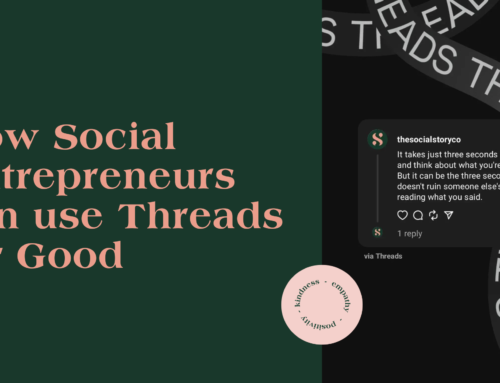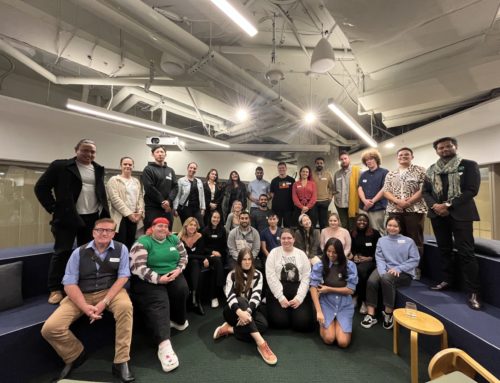Key Takeaways:
– Brands have a lot to learn about social media from Gen Z as not only fluent communicators in digital, but creators of the digital language
– Brands need to examine their whole business structure to see how they can put values first – not just in performative ways
– It’s all about building trust back from a generation that is frustrated with how the world does not seem to work in their favour, particularly as we build back from the pandemic.
Having worked in social for 7+ years, I’ve watched as big brands struggle with what to do with social. Many thought that it was just another channel on which to post the same old things. Many thought the trends would pass. And many scoffed as each new platform came out and the younger generations jumped on it. But as we saw most distinctly in the print industry, social is not something we can ignore.
Putting social first signifies a change in mindset. It’s about understanding that social media isn’t just a platform but something that has shaken up the communications landscape is crucial to not being left behind. We must truly go in and figure out what social is and what this language of subtweeting and memes actually reveals and meeting the audience there.
And so we look to Gen Z – the generation that embodies everything that social media is at this moment. We so quickly Gen Z as young, inexperienced and too consumed with their phones. And yes, it’s true that they barely remember life before a smartphone. They don’t know life before the internet. But that is their strength because what they didn’t learn in communicating in analogue ways, they’ve found in the digital world.
And they are getting shit done.
In fact, they have vehemently taken on the responsibility to reverse many of the ills brought to us by our previous generations – particularly in the environment and capitalist structures that continues to exclude women, queer people and POC.
Deep diving into Gen Z and how they show up online is to understand social media itself. They’re not just fluent in the language of the internet. They are shaping the conversations. It’s time to come down from the picket line and listen to what truly is our future.
Deep diving into Gen Z and how they show up online is to understand social media itself.
1. Gen Z give a shit and feel empowered to make a difference
It is lazy to think that the youth are disengaged. Last month, we attended the Youth Marketing Virtual Summit and the theme was consistent: young people want change and they will create it. But even countless research and data analysis doesn’t need to convince you of what we’re seeing on the streets and online – it’s young people leading the climate school strikes, it’s young people making their voices heard about race relations.
And while most of us can question the validity of slacktivism – Gen Z feel empowered that their actions can actually make a difference. They are more creative, they have more platforms that make their voices heard, they have more access to information and each other. They know how to channel their curiosity and influence through the digital platforms to speak out and be more informed. In their own words:
“As the first generation of ‘digital natives,’ we are far more empowered to use our creativity and innovation to have an impact on the world.”
—Jeremiah, Gen Zer from the Facebook IQ Gen Z Report
They have grown increasingly frustrated with archaic structures that are rigged against their success. The environment, college admission schemes, increasing inequality and economic crises – the chance to build that dream of buying a house and having a stable job forever more is something of a distant memory, not only because it seems utterly unattainable but misaligned with what Gen Z value.
Greta Thunberg’s ‘How Dare You’ speech at the 2019 UN climate action summit is perhaps one of the more emphatic and indignant cries of this frustration. And the degrees to which this is felt may waver in each Gen Zer and across a wide cross section of social causes including the climate crisis but the message rings true.
This indignation has led to action. And it may not look the same as the Civil Rights movements of the 60s, but it cannot be ignored. And it is only getting stronger, particularly since the pandemic. 61% of Gen Zers say they’ve become more interested in activism and social causes since the pandemic began (according to the same Facebook IQ research). But you just need to look to the streets and the feeds to see who are leading the racial protests and the climate strikes to know that these children really are our future.
2. They are demanding more from their brands
This acknowledgement of their impact is particularly evident in Gen Z’s purchasing behaviours. 93% of Gen Zers say it’s important that businesses display responsibility to the triple bottom line (considering the profit, the people and the planet) according to YouthSense’s report on Gen Z and Corporate Activism.
Corporate Social Responsibility is no longer just a buzzword; a tickbox for big businesses to blast all over their marketing as a way of looking good. Amidst an era of fake news and crippling institutions, there is a huge trust deficit between big business and young consumers. And the brands that will thrive are those that not only stand for something, but truly follow through.
Take the diversity conversation happening at the moment. Perhaps five years ago (maybe even two!) we’d start seeing different skin tones or body shapes in our marketing. But today, that’s not enough. Sure, representation is still important and 78% of Gen Zers want to be seeing more diversity in the media they consume. But 74% of them also want businesses to publicise the diversity of their workplace (YouthSense).
It truly feels like a revolution because we’re understanding how deep these changes need to go to truly make a difference. It needs to be external and internal in an organisation as well as individuals. We need to understand how privilege prevails in both institutions and within ourselves.
3. They will put their money where their mouth is
Brands who do step up to the challenge will be rewarded. 88% of Genzers are more likely to support businesses that put their profits toward good causes (YouthSense). 61% would pay more for products that are produced in a more ethical and sustainable way (Facebook IQ). This is why social enterprises are in the place to shine.
The disruptive nature of their business models and the core focus for positive impact encompasses all these figures and numbers about Gen Z as consumers. And here’s one more for you – 50% of Gen Zers are already actively buying from social enterprises.
If this pandemic has taught us anything, this is a real opportunity for all businesses, no matter their size, to be reconsidering how they show up for their customers in more authentic and compassionate ways. And taking the lead from social enterprises isn’t just good for the word, it’s an economically sound decision to focus on what will soon be the most powerful consumer demographic of the global economy.
Quite simply, to ignore Gen Z is a bad business decision. So you want to find ways to show up more authentically as a business that wants to make a change?
- Make structural changes to make your production processes factor in sustainability and your team and marketing reflect diversity
- Give back in meaningful ways. Maybe it’s about donating profits to charity, or empowering your employees to volunteer. Some corporations in Australia have also allowed their employees to take paid vacation days, with some stipend to go into bushfire-affected town to help give back to the local economy.
- Show up authentically. If you’re going to stand for something bigger than profit, don’t just do it for show. Be committed to making the big and difficult changes. Be open to getting it wrong while you figure it out. But never waver from the commitment you made.
Photo by Markus Spiske from Pexels





